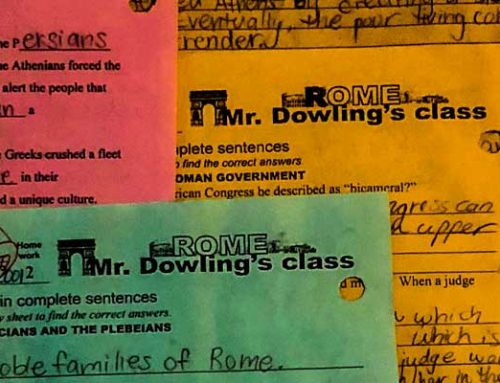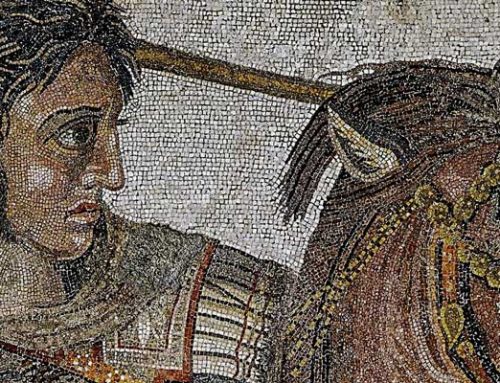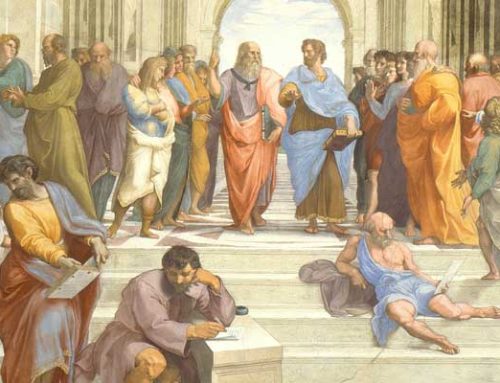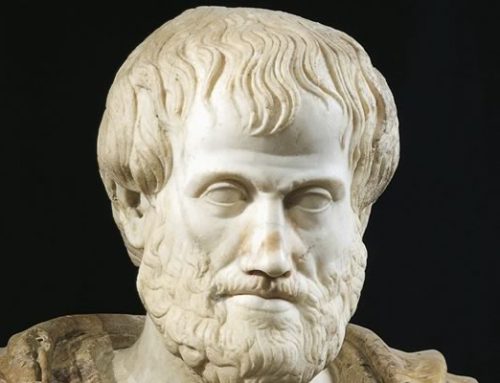Athens is the capital and largest city in modern Greece, but Athens also has a long history that dates back 7000 years. Modern ideas about democracy first developed in ancient Athens. Unlike Sparta, it was difficult for the rulers of ancient Athens to have complete control over their citizens. Athens developed as a merchant poli whose ships traded with many faraway places. The traders were exposed to many new ideas.
The first Athenian rulers were warriors who controlled the poli by force. The warrior families called themselves aristocrats. Aristoi- comes from a Greek word meaning “best people.” The tyrant was the leader of the aristocrats. Today we use the term tyrant to describe a cruel ruler, but many of the Athenian tyrants were kind and effective leaders.
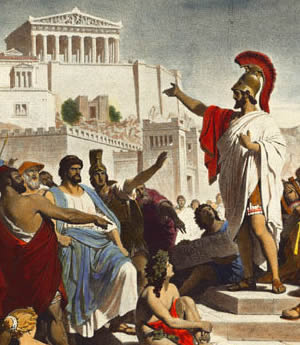
Democracy_Athens
Athens is widely referred to as the birthplace of democracy.
In about 622BCE, a tyrant named Draco created a written legal system and a court to enforce his laws. Draco’s court meted out harsh punishments for even minor offenses. Today we use the word draconian to describe laws that are unnecessarily harsh or unjust.
The Athenian army fought in a phalanx, a military formation of soldiers with overlapping shields that moved together as a unit. The mighty phalanx was more powerful than any individual aristocratic warrior. By Draco’s rule, soldiers no longer needed to be wealthy enough to afford a horse, so Athenians from less prosperous families could join the army. The aristocratic leaders learned to consider the needs of all Athenian families to keep from losing support from the army.
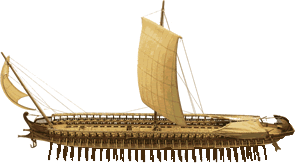
Trireme_Ancient_Greece
Athenian sailors traveled the seas in ships called triremes. The trireme derives its name from having three rows of oars.
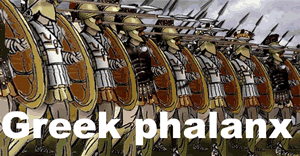
In 594BCE, Solon became the leader of Athens. Solon repealed Draco’s harshest laws and assembled a group of ordinary citizens to vote on how Athens would be governed. The Assembly gathered forty times a year and was open to all male citizens with at least two years of military service.
The word for people in ancient Greek was demos. Kratos meant rule. The government created by Solon was a democracy, where the people ruled the polis. Most democratic nations have elected representatives to make laws, but Athens was a direct democracy because the citizens acted as lawmakers.
Direct democracy was possible in ancient Athens and even today is the system by which many small towns operate. However, gathering all citizens together to make decisions is not practical in large countries such as the United States.
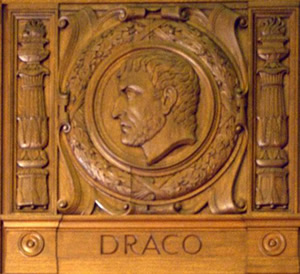
Draco_Ancient_Athens
Draco (c. 7th century BCE) replaced the oral law in Athens with a written code to be enforced by a court.This wood carving of Draco is in the main reading room of the Supreme Court library in Washington, D.C.
A council known as the boule managed the daily affairs of the polis. Members of the boule were not elected; they were chosen randomly from the Assembly so that every qualified person had an equal opportunity to serve on the council. At the end of the year, members of the boule appeared before the Assembly to account for their work.
Only adult males born in Athens participated in the assembly. Athens encouraged outsiders to move to their polis, but only free-born males could vote. Women could own property but were not allowed to participate in the democratic process. The members of the Assembly had time to work on public affairs because slaves did most of the physical work in the polis. About one in four people living in Athens were slaves.
Consequently, the members of the Assembly accounted for only about one-fourth of the total population of Athens.
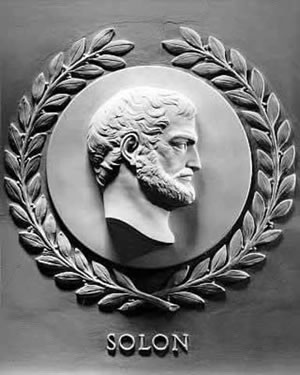
Solon_of_Athens
Solon (c. 638 – c. 558 BC) was an Athenian statesman who assembled a group of ordinary citizens to vote on how Athens was to be governed.This bas-relief of Solon is included with those of 22 other great lawmakers in the United States Capitol.
Participation in government by common people was an idea that eventually became a model for other nations. The democratic government in Athens inspired the writers of the American Constitution. Athenian democracy was limited, but it gave some people the opportunity to make decisions about how they were governed.
Resources
Download this lesson as Microsoft Word file or as an Adobe Acrobat file.
View a Powerpoint presentation of this lesson.
Listen as Mr. Dowling reads this lesson.
Lexile Measure 1010L
Mean Sentence Length 14.84
Mean Log Word Frequency 3.41
Word Count 564
Mr. Donn has an excellent website that includes a section on Ancient Greece.
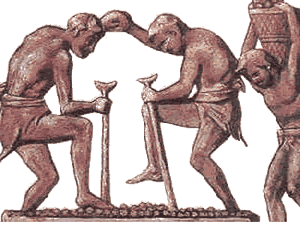
Athenian_slaves
The members of the Assembly had time to work on public affairs because slaves did most of the physical work in the polis. About one in four people living in Athens were slaves.

